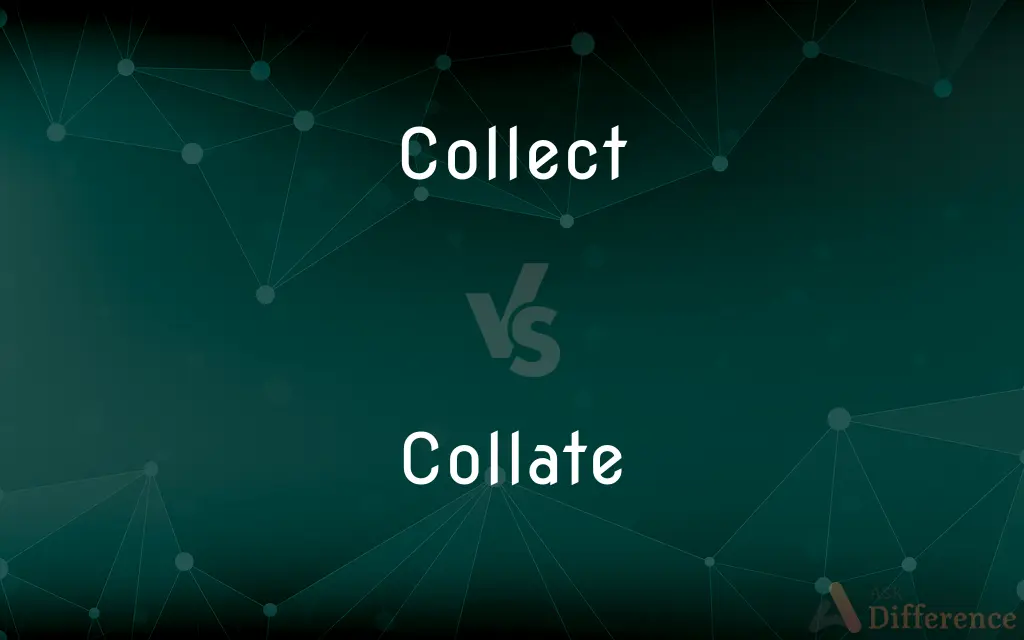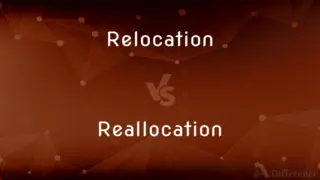Collect vs. Collate — What's the Difference?
By Tayyaba Rehman & Fiza Rafique — Updated on March 27, 2024
Collecting involves gathering items or data, focusing on the act of accumulation; collating is about organizing or assembling gathered items in a specific sequence, emphasizing order and structure.

Difference Between Collect and Collate
Table of Contents
ADVERTISEMENT
Key Differences
Collecting is the process of bringing together various items, data, or pieces of information from different sources. On the other hand, collating involves sorting and organizing collected items into a meaningful sequence or order.
While collecting can be seen as the first step in an overarching process that might include collating as a subsequent action, collating inherently requires that items have already been collected. The distinction lies in the purpose and outcome of each activity: collecting aims to gather, while collating aims to organize.
In practice, the significance of collating becomes apparent in the management and analysis of data, where the organization of information can lead to meaningful insights and conclusions. Similarly, in everyday tasks such as preparing reports or documents, the act of collating ensures that the information presented follows a logical sequence, enhancing comprehension and utility.
While collecting and collating can be part of the same workflow, they serve distinct roles within it. Collecting focuses on the acquisition and accumulation of items, and collating on their orderly arrangement. Both processes are essential in their respective contexts, from academic research to hobbies and professional tasks.
Comparison Chart
Definition
Gathering items or data from various sources.
Organizing collected items in a specific sequence.
ADVERTISEMENT
Focus
Accumulation without immediate concern for order.
Sequence and structure of items.
Purpose
To gather materials for various uses.
To arrange materials in an orderly manner for analysis or presentation.
Process
Can be random or based on broad criteria.
Involves sorting and aligning according to specific criteria.
Outcome
A collection of items without specified order.
An organized set of items ready for use or analysis.
Compare with Definitions
Collect
Bringing together diverse elements.
He collects ideas for his novel from daily observations.
Collate
To organize or arrange items in a specific order.
The librarian collates the books according to the Dewey Decimal System.
Collect
To gather items or information from different sources.
She collects vintage postcards from every city she visits.
Collate
Systematic arrangement for presentation or use.
The teacher collates educational resources for easy access.
Collect
Hobby or activity of gathering.
Collecting stamps has been his hobby since childhood.
Collate
Sorting and assembling documents or data.
She collates the pages of the report before binding.
Collect
Accumulation of objects or data for a purpose.
The scientist collects soil samples for analysis.
Collate
Aligning objects or information for analysis.
Collating data from different studies, the researcher identifies patterns.
Collect
Act of assembling without immediate order.
They collect customer feedback through various channels.
Collate
Act of sequencing items meaningfully.
Collating historical events, the author clarifies the timeline.
Collect
The collect ( KOL-ekt) is a short general prayer of a particular structure used in Christian liturgy. Collects appear in the liturgies of Roman Catholic, Orthodox, Anglican, Methodist, Lutheran, and Presbyterian churches, among others (in those of Eastern Christianity the Greek term [déesis] synapté is often used instead of the Latin term [oratio] collecta, both having the same meaning).
Collate
Collect and combine (texts, information, or data)
All the information obtained is being collated
Collect
Bring or gather together (a number of things)
He went round the office collecting old coffee cups
Collate
Appoint (a member of the clergy) to a benefice.
Collect
Call for and take away; fetch
The children were collected from school
Collate
To examine and compare carefully in order to note points of disagreement.
Collect
Regain control of oneself, typically after a shock
He paused for a moment to take a breath, to collect himself
Collate
To assemble in proper numerical or logical sequence.
Collect
Conclude; infer
By all best conjectures, I collect Thou art to be my fatal enemy
Collate
To examine (gathered sheets) in order to arrange them in proper sequence before binding.
Collect
Cause (a horse) to bring its hind legs further forward as it moves
A rider should want to be able to collect a horse when hacking
Collate
To verify the order and completeness of (the pages of a volume).
Collect
Collide with
He lost control of the truck and collected two cats
Collate
(Ecclesiastical) To admit (a cleric) to a benefice.
Collect
(with reference to a telephone call) to be paid for by the person receiving it
I called my mother collect
Collate
(transitive) To examine diverse documents and so on, to discover similarities and differences.
The young attorneys were set the task of collating the contract submitted by the other side with the previous copy.
Collect
(with reference to a telephone call) to be paid for by the person receiving it
I called my mother collect
Collate
(transitive) To assemble something in a logical sequence.
Collect
A winning bet.
Collate
(transitive) To sort multiple copies of printed documents into sequences of individual page order, one sequence for each copy, especially before binding.
Collating was still necessary because they had to insert foldout sheets and index tabs into the documents.
Collect
(in church use) a short prayer, especially one assigned to a particular day or season.
Collate
(obsolete) To bestow or confer.
Collect
To bring together in a group or mass; gather
The teacher collected the exams.
Collate
To admit a cleric to a benefice; to present and institute in a benefice, when the person presenting is both the patron and the ordinary; followed by to.
Collect
To accumulate as a hobby or for study
Collect old coins.
Collect folk tales.
Collate
To compare critically, as books or manuscripts, in order to note the points of agreement or disagreement.
I must collage it, word, with the original Hebrew.
Collect
To call for and obtain payment of
Collect taxes.
Collate
To gather and place in order, as the sheets of a book for binding.
Collect
To be the site for (an accumulating mass), especially as a consequence of disuse or neglect
My guitar is collecting dust in the corner.
Collate
To present and institute in a benefice, when the person presenting is both the patron and the ordinary; - followed by to.
Collect
To recover control of
Collect one's emotions.
Collate
To bestow or confer.
Collect
To call for (someone); pick up
Collected the children and drove home.
Collate
To place in a benefice, when the person placing is both the patron and the ordinary.
If the bishop neglets to collate within six months, the right to do it devolves on the archbishop.
Collect
To come together in a group or mass; gather
Sand collected in the crevices.
Collate
Compare critically; of texts
Collect
To take in payments or donations
Collecting for charity.
Collate
To assemble in proper sequence;
Collate the papers
Collect
With payment to be made by the receiver
Called collect.
A collect phone call.
Collect
A brief formal prayer that is used in various Western liturgies before the epistle and that varies with the day.
Collect
(transitive) To gather together; amass.
Suzanne collected all the papers she had laid out.
Collect
(transitive) To get; particularly, get from someone.
A bank collects a monthly payment on a client's new car loan.
A mortgage company collects a monthly payment on a house.
Collect
(transitive) To accumulate (a number of similar or related objects), particularly for a hobby or recreation.
John Henry collects stamps.
I don't think he collects as much as hoards.
My friend from school has started to collects mangas and novels recently
Collect
To form a conclusion; to deduce, infer. (Compare gather, get.)
Collect
To collect payments.
He had a lot of trouble collecting on that bet he made.
Collect
(intransitive) To come together in a group or mass.
The rain collected in puddles.
Collect
(transitive) To infer; to conclude.
Collect
To collide with or crash into (another vehicle or obstacle).
The truck veered across the central reservation and collected a car that was travelling in the opposite direction.
Collect
To be paid for by the recipient, as a telephone call or a shipment.
It was to be a collect delivery, but no-one was available to pay.
Collect
With payment due from the recipient.
I had to call collect.
Collect
(Christianity) The prayer said before the reading of the epistle lesson, especially one found in a prayerbook, as with the Book of Common Prayer.
He used the day's collect as the basis of his sermon.
Collect
To gather into one body or place; to assemble or bring together; to obtain by gathering.
A band of menCollected choicely from each country.
'Tis memory alone that enriches the mind, by preserving what our labor and industry daily collect.
Collect
To demand and obtain payment of, as an account, or other indebtedness; as, to collect taxes.
Collect
To infer from observed facts; to conclude from premises.
Which sequence, I conceive, is very ill collected.
Collect
To assemble together; as, the people collected in a crowd; to accumulate; as, snow collects in banks.
Collect
To infer; to conclude.
Whence some collect that the former word imports a plurality of persons.
Collect
A short, comprehensive prayer, adapted to a particular day, occasion, or condition, and forming part of a liturgy.
The noble poem on the massacres of Piedmont is strictly a collect in verse.
Collect
A short prayer generally preceding the lesson in the Church of Rome or the Church of England
Collect
Get or gather together;
I am accumulating evidence for the man's unfaithfulness to his wife
She is amassing a lot of data for her thesis
She rolled up a small fortune
Collect
Call for and obtain payment of;
We collected over a million dollars in outstanding debts
He collected the rent
Collect
Assemble or get together;
Gather some stones
Pull your thoughts together
Collect
Get or bring together;
Accumulate evidence
Collect
Gather or collect;
You can get the results on Monday
She picked up the children at the day care center
They pick up our trash twice a week
Collect
Payment due by the recipient on delivery;
A collect call
The letter came collect
A COD parcel
Collect
Make a telephone call or mail a package so that the recipient pays;
Call collect
Send a package collect
Common Curiosities
What is an example of collating in everyday life?
Organizing bills or statements in chronological order for filing is a common form of collating.
How does collecting differ from hoarding?
Collecting involves selective gathering of items often for a hobby or purpose, while hoarding implies accumulating items compulsively, often without order or utility.
Why is collating important in research?
Collating allows researchers to organize data systematically, facilitating analysis and insight generation.
What does it mean to collect data?
Gathering information from various sources for analysis or documentation, without immediate organization.
Can you collect and collate at the same time?
Typically, collecting precedes collating; first, items are gathered, then organized.
Can collating affect the outcome of a project?
Yes, properly collated information can enhance the clarity and effectiveness of a project, report, or research.
Is there a tool to help with collating?
Various software and applications can assist in collating digital data, while physical items may require manual sorting.
What skills are important for effective collecting?
Observation, research, and selection skills are key to identifying and gathering relevant items or data.
How can collecting become a teaching tool?
Collecting can teach about history, culture, or nature through the accumulation of thematic items, encouraging learning and exploration.
What is the significance of collating in publishing?
In publishing, collating ensures that pages or sections of a book are in the correct order before final binding.
How do libraries use collating?
Libraries use collating to organize books, magazines, and other materials in an orderly system for easy access and reference.
Is collecting always a physical activity?
No, collecting can also refer to digital items or data, such as eBooks, photographs, or online articles.
How does collating relate to compiling?
Collating is a form of compiling where the focus is on arranging items in a specific sequence.
What skills are important for effective collating?
Organizational and analytical skills are crucial for arranging collected items in a meaningful order.
How do hobbies benefit from collecting and collating?
Hobbies like stamp or coin collecting benefit from the organization and systematic arrangement, enhancing enjoyment and knowledge.
Share Your Discovery

Previous Comparison
Relocation vs. Reallocation
Next Comparison
Quanta vs. QuantumAuthor Spotlight
Written by
Tayyaba RehmanTayyaba Rehman is a distinguished writer, currently serving as a primary contributor to askdifference.com. As a researcher in semantics and etymology, Tayyaba's passion for the complexity of languages and their distinctions has found a perfect home on the platform. Tayyaba delves into the intricacies of language, distinguishing between commonly confused words and phrases, thereby providing clarity for readers worldwide.
Co-written by
Fiza RafiqueFiza Rafique is a skilled content writer at AskDifference.com, where she meticulously refines and enhances written pieces. Drawing from her vast editorial expertise, Fiza ensures clarity, accuracy, and precision in every article. Passionate about language, she continually seeks to elevate the quality of content for readers worldwide.














































